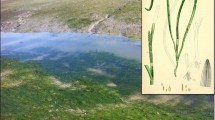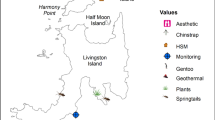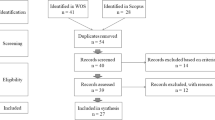Abstract
To sustainably manage naturally scarce resources, island communities often evolve complex mechanisms including customary laws, belief systems, and reciprocity arrangements among others, to prevent overharvest. Their effectiveness depends largely on the extent to which resource users comply with the rules. We examined patterns of compliance with traditional marine management in the Nicobar Archipelago, India, before, and six years after, the 2004 tsunami. We used interview-based surveys to document marine harvest regulations, and changes in compliance patterns. Our results indicate that pre-tsunami, complex harvest rules existed, including spatio-temporal closures, gear restrictions and species bans; many reefs were subject to multiple, overlapping restrictions. Post-tsunami, compliance weakened considerably; younger individuals (19–35 years) and individuals receiving tsunami aid (boats, gear, etc.) were the most likely non-compliers. Around 84 % of interviewees attributed declining compliance directly to post-tsunami changes in resource availability and a perceived decline in traditional authority. Changes in resource availability can interact strongly with institutional decline, eroding the resilience of traditional management.


Similar content being viewed by others
Notes
References
Adger, W. N. (2000). Social and Ecological Resilience: are They Related? Progress in Human Geography 24(3): 347–364.
Ahmed, S. K. Z., Ravikumar, T., Krishnan, P., and Jeyakumar, S. (2013). Traditional Fishing Crafts and Gears Used by the Nicobari Tribes in Car Nicobar. Indian Journal of Traditional Knowledge 12(1): 144–148.
Alvard, M. S. (1993). Testing the “Ecologically Noble Savage” Hypothesis: Interspecific Prey Choice by Piro Hunters of Amazonian Peru. Human Ecology 21(4): 355–387.
Alvard, M. S. (1994). Conservation by Native Peoples. Human Nature 5(2): 127–154.
Aswani, S., and Lauer, M. (2014). Indigenous People’s Detection of Rapid Ecological Change. Conservation Biology 28(3): 820–828.
Bartlett, C., Manua, C., Cinner, J., Sutton, S., Jimmy, R., South, R., Nilsson, J., and Raina, J. (2009). Comparison of Outcomes of Permanently Closed and Periodically Harvested Coral Reef Reserves. Conservation Biology 23: 1475–1484.
Becker, C. D., and Ostrom, E. (1995). Human Ecology and Resource Sustainability: the Importance of Institutional Diversity. Annual Review of Ecology and Systematics 26: 113–133.
Berkes, F., Kislalioglu, M., Folke, C., and Gadgil, M. (1998). Exploring the Basic Ecological Unit: Ecosystem-like Concepts in Traditional Societies. Ecosystems 1: 409–415.
Berkes, F., Cyoungering, J., and Folke, C. (2000). Rediscovery of Traditional Ecological Knowledge as Adaptive Management. Ecological Applications 10: 1251–1262.
Bromley, D. W. (1989). Economic Interests and Institutions. The Conceptual Foundations of Public Policy. Basil Blackwell, Oxford.
Burnham, K. P., and Anderson, D. R. (2004). Multimodel Inference Understanding AIC and BIC in Model Selection. Sociological Methods & Research 33(2): 261–304.
Carr, L. M., and Heyman, W. D. (2014). Using a Coupled Behavior-Economic Model to Reduce Uncertainty and Assess Fishery Management in a Data-Limited, Small-Scale Fishery. Ecological Economics 102: 94–104.
Chandi M. (2006) Rehabilitation and Change in the Aftermath of a Tsunami. A return to Little Nicobar island. Paper chosen for Proceedings of the ‘First India Disaster Management Congress’, organized by the National Institute of Disaster Management, under the Ministry of Home Affairs, New Delhi, India. November 29th. 2006.
Chuenpagdee, R., Pascual-Fernández, J. J., Szeliánszky, E., Luis Alegret, J., Fraga, J., and Jentoft, S. (2013). Marine Protected Areas: Re-Thinking Their Inception. Marine Policy 39: 234–240.
Cinner, J. E., and Aswani, S. (2007). Integrating Customary Management into Marine Conservation. Biological Conservation 140(3): 201–216.
Cinner, J. E., and McClanahan, T. R. (2006). Socioeconomic Factors that Lead to Overfishing in Small-Scale Coral Reef Fisheries of Papua New Guinea. Environmental Conservation 33: 73–80.
Colding, J., and Folke, C. (2001). Social Taboos: “Invisible” Systems of Local Resource Management and Biological Conservation. Ecological Applications 11: 584–600.
Crawley, M. J. (2007). The R Book. John Wiley, Chichester, UK.
Director-Census Operations (2011). Provisional Population Total: Rural–urban Distribution, Andaman and Nicobar Islands. Directorate of Census Operations, Government of India 2 (35) 1–79.
Drew, J. A. (2005). Use of Traditional Ecological Knowledge in Marine Conservation. Conservation Biology 19(4): 1286–1293.
Foale, S., and Manele, B. (2004). Social and Political Barriers to the Use of Marine Protected Areas for Conservation and Fishery Management in Melanesia. Asia Pacific Viewpoint 45: 373–386.
Foale, S., Cohen, P., Januchowski-Hartley, S., Wenger, A., and Macintyre, M. (2011). Tenure and Taboos: Origins and Implications for Fisheries in the Pacific. Fish and Fisheries 12: 357–369.
Halpern, B. S., Selkoe, K. A., White, C., Albert, S., Aswani, S., and Lauer, M. (2013). Marine Protected Areas and Resilience to Sedimentation in the Solomon Islands. Coral Reefs 32(1): 61–69.
Hardin, G. (1968). The Tragedy of the Commons. Science 162: 1243–1248.
Hickey, F. (2006). Traditional Marine Resource Management in Vanuatu: Acknowledging, Supporting and Strengthening Indigenous Management Systems. SPC, Traditional Marine Resource Management and Knowledge Information Bulletin 20: 11–23.
Hilbe, J. M. (1994). Generalized Linear Models. The American Statistician 48(3): 255–265.
Holling, C. S., Berkes, F., and Folke, C. (1998). Science, Sustainability and Resource Management: Linking Social and Ecological Systems: Management Practices and Social Mechanisms for Building Resilience. Cambridge University Press, Cambridge, pp. 13–20.
Hughes, T. P., Bellwood, D. R., Folke, C., Steneck, R. S., and Wilson, J. (2005). New Paradigms for Supporting the Resilience of Marine Ecosystems. Trends in Ecology and Evolution 20(7): 380–386.
Johannes, R. E. (1978). Traditional Marine Conservation Methods in Oceania and their Demise. Annual Review of Ecology and Systematics 9: 349–364.
Johannes, R. E. (2002). The Renaissance of Community-Based Marine Resource Management in Oceanica. Annual Review of Ecology and Systematics 33: 317–340.
Justin, A. (1990). The Nicobarese. Seagull Books, Calcutta.
Kuale, S. (1996). Interviews: An Introduction to Qualitative Research Interviewing. Sage, California.
Lawler, J. J., Tear, T. H., Pyke, C., Shaw, M. R., Gonzalez, P., Kareiva, P., Hansen, L., Hannah, L., Klausmeyer, K., and Aldous, A. (2008). Resource Management in a Changing and Uncertain Climate. Frontiers in Ecology and the Environment 8: 35–43.
Levine, A. S., and Richmond, L. S. (2014). Examining Enabling Conditions for Community-Based Fisheries Comanagement: Comparing Efforts in Hawai ‘i and American Samoa. Ecology and Society 19(1): 24.
Lloyd, M. G., Peel, D., and Duck, R. W. (2013). Towards a Social–Ecological Resilience Framework for Coastal Planning. Land Use Policy 30(1): 925–933.
Lundquist, C. J., and Granek, E. F. (2005). Strategies for Successful Marine Conservation: Integrating Socioeconomic, Political, and Scientific Factors. Conservation Biology 19(6): 1771–1778.
Madin, J. S., and Connolly, S. R. (2006). Ecological Consequences of Major Hydrodynamic Disturbances on Coral Reefs. Nature 444: 477–480.
McCarter, J., and Gavin, M. C. (2014). Local Perceptions of Changes in Traditional Ecological Knowledge: a Case Study from Malekula Island, Vanuatu. Ambio 43(3): 288–296.
McClanahan, T. R., Cinner, J. E., Abunge, C., Rabearisoa, A., Mahatante, P., Ramahatratra, F., and Andrianarivelo, N. (2014). Perceived Benefits of Fisheries Management Restrictions in Madagascar. Ecology and Society 19(1): 5.
Meppem, T., and Gill, R. (1998). Planning for Sustainability as a Learning Concept. Ecological Economics 26(2): 121–137.
Nyström, M., and Folke, C. (2001). Spatial Resilience of Coral Reefs. Ecosystems 4(5): 406–417.
Olsson, P. (2004). Socio-ecological Transformation for Ecosystem Management: the Development of Adaptive Co-management of a Wetland Landscape in Southern Sweden. Conservation Ecology 9(4): 123–126.
Ostrom, E. (1990). Governing the Commons, the evolution of Institutions for Collective Action. Cambridge University Press, Cambridge.
Patankar, V., D’Souza, E., Kumaraguru, A. K., and Arthur, R. (2012). Distance-Related Threshyoungers and Influence of the 2004 Tsunami on Damage and Recovery Patterns of Coral Reefs in the Nicobar Islands. Current Science 102(8): 11–99.
Pinheiro, J., Bates, D., DebRoy, S., Sarkar, D., and the R Development Core Team (2012). nlme: Linear and Nonlinear Mixed Effects Models. R package version 3. pp. 1–104.
R Development Core Team (2011) R: A Language and Environment For Statistical Computing. R Foundation for Statistical Comput- ing, Vienna, Austria. ISBN 3-900051-07-0, URL http://www.R-project.org/
Ramachandran, S., Anitha, S., Balamurugan, V., Dharanirajan, K., Ezhil Vendhan, K., Divien, M. I. P., Senthil Vel, A., Sujjahad Hussain, I., and Udayaraj, A. (2005). Ecological Impact of Tsunami on Nicobar Islands (Camorta, Katchal, Nancowry and Trinkat). Current Science 89(1): 195–200.
Ramanujam, R. V., Singh, S. J., and Vatn, A. (2012). From the Ashes into the Fire? Institutional Change in the Post-Tsunami Nicobar Islands, India. Society & Natural Resources 25(11): 1152–1166.
Raymond, H. (2007). The Ecologically Noble Savage Debate. Annual Review of Anthropology 36: 177–190.
Ruddle, K. (1998). The Context of Policy Design for Existing Community-Based Fisheries Management Systems in the Pacific Islands. Ocean and Coastal Management 40(2): 105–126.
Ruddle, K., Hviding, E., and Johannes, R. E. (1992). Marine Resources Management in the Context of Customary Tenure. Marine Resource Economy 7: 249–273.
Ruttan, L. M. (1998). Closing the Commons: Cooperation for Gain or Restraint? Human Ecology 26: 43–66.
Saini (2013). Post-Tsunami Socio-Cultural Changes Among the Nicobarese: An Ethnography of the Nicobarese of the Southern Nicobar Islands. TISS working paper, Mumbai, India, pp. 1–41.
Saldanha, C. J. (1989). Andaman, Nicobar and Lakshadweep. An Environmental Impact Assessment. Oxford & India book house, New Delhi.
Sankaran, R. (1996). Developing a Protected Area Network in the Nicobar Islands: the Perspective of Endemic Avifauna. Salim Ali Centre for Ornithology and Natural History, Kalampalayam, pp. 1–42.
Sankaran, R., Andrews, H., and Vaughan, A. (2005). The ground beneath the waves. In Kaul, R., and Menon, V. (eds.), Post-tsunami Impact Assessment of Wildlife and their Habitats in India. Wildlife Trust of India, Sacon, Anet, IFAW, New Delhi, pp. 1–103.
Sekhsaria, P. (2009). When Chanos Chanos Became Tsunami Macchi: the Post-December 2004 Scenario In The Andaman & Nicobar Islands. Journal of the Bombay Natural History Society 106(3): 256.
Sievanen, L., Gruby, R. L., and Campbell, L. M. (2013). Fixing Marine Governance in Fiji? The New Scalar Narrative of Ecosystem-Based Management. Global Environmental Change 23(1): 206–216.
Singh, S. J. (2003). In the Sea of Influence: A World System Perspective of the Nicobar Islands. Lund University, Lund.
Singh, S. J. (2006). The Nicobar Islands: Cultural Choices in the Aftermath of the Tsunami. Oliver Lehmann, Czernin Verlag Vienna, Austria 228.
Singh, S. J. (2009). Complex Disasters: the Nicobar Islands in the Grip of Humanitarian aid. Geographische Rundschau - International Edition 5(3): 48–56.
Thornton, T. F., and Scheer, A. M. (2012). Collaborative Engagement of Local and Traditional Knowledge and Science in Marine Environments: a Review. Ecology and Society 17(3): 8.
Vatn, A. (2005). Institutions and the Environment. Edward Elgar, Cheltenham.
Veitayaki, J. (1997). Traditional Marine Resource Management Practices used in the Pacific Islands: an Agenda for Change. Ocean and Coastal Management 37: 123–136.
White, A. T., Courtney, C. A., and Salamanca, A. (2002). Experience with Marine Protected Area Planning and Management in the Philippines. Coastal Management 30: 1–26.
Acknowledgments
The Department of Environment and Forests, Port Blair and the A & N Administration provided permits to carry out research. Andaman and Nicobar Islands Environmental Team (ANET), Madras Crocodile Bank Trust, Madurai Kamaraj Univeristy (MKU) and Reef Watch Marine Conservation (RWMC) also provided crucial support. A.K. Kumaraguru and M. Chandi gave inputs while designing field surveys. N. Kelkar and Jordi Pagès helped in statistical analysis. Martin, Emanuel and Youriel helped in data collection. We thank V. Ramanujan and two anonymous reviewers for suggesting changes, which improved the quality of the manuscript.
Ethical Standards
Our research entailed work with human communities adhering to all standard ethical norms. Nicobarese are a Scheduled Tribe of India, and entry into the islands is regulated by the ‘Andaman & Nicobar Islands Protection of Aboriginal Tribes Regulation 1956’. We obtained the requisite ‘Tribal Area Entry Permits’ to land and conduct research from the Department of Tribal Welfare and District Commissioner’s office at Port Blair and Kamorta for all seven visits to the Nicobar archipelago. During each visit, we also obtained the permission to conduct research from the Chief Captain of the village and Chairperson of the Tribal Council of the area.
We obtained all requisite clearances from the Nature Conservation Foundation’s Institutional ethical committee as well as from members of the doctoral research committee prior to conducting fieldwork. We conducted interviews after arranging a suitable time suggested by each respondent. Before we began each interview, we read out the ethical statement and ensured that the personal responses of the interviewee will be kept confidential. We collected personal information only for the purpose of records and analysis. All interviews were voluntary and participants were given the option to remove their responses from the study at anytime. A written consent was not obtained due to low literacy levels amongst Nicobarese.
We gave regular updates about our work and the progress we made and we did not share the raw data with either respondents or any other agencies/institutions.
Conflict of Interest
The authors declare that they have no conflict of interests.
Author information
Authors and Affiliations
Corresponding author
Rights and permissions
About this article
Cite this article
Patankar, V., D’Souza, E., Alcoverro, T. et al. Erosion of Traditional Marine Management Systems in the Face of Disturbances in the Nicobar Archipelago. Hum Ecol 43, 697–707 (2015). https://doi.org/10.1007/s10745-015-9781-x
Published:
Issue Date:
DOI: https://doi.org/10.1007/s10745-015-9781-x




